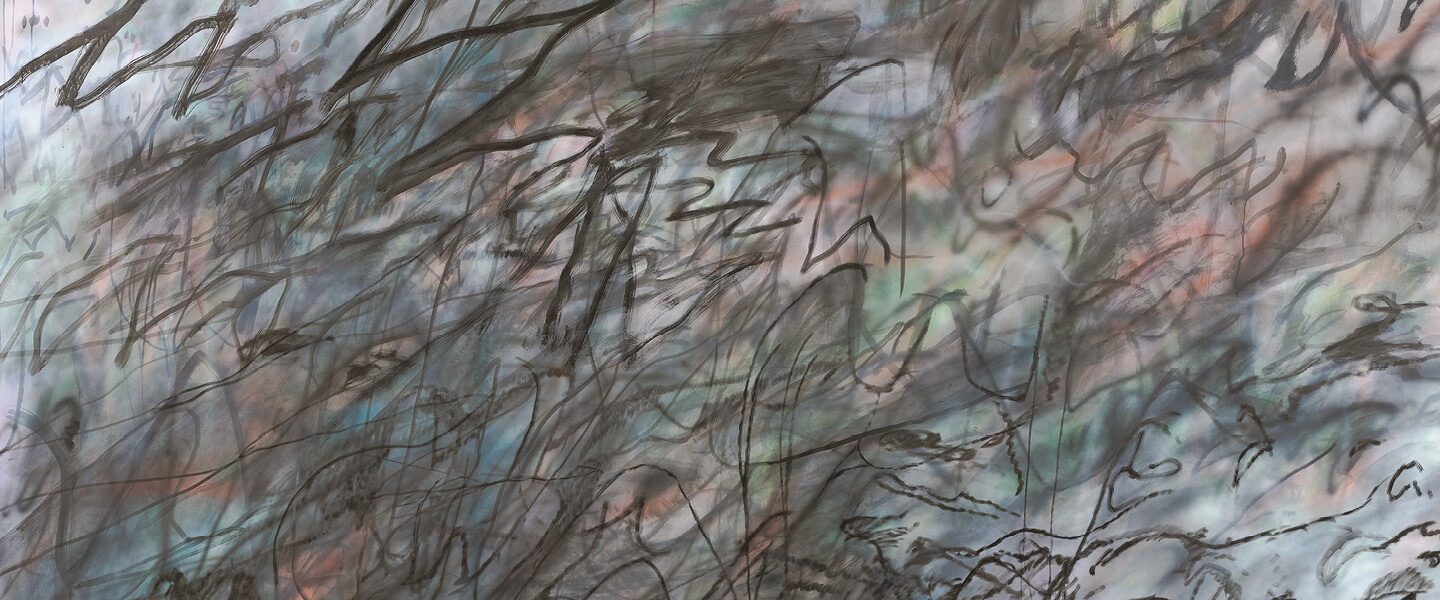May 19–September 3, 2017
May 5–September 3, 2017
Rua D. João de Castro, 210
4150–417 Porto
Portugal
Hours: Monday–Sunday 10am–7pm,
Saturday–Sunday 10am–8pm
T +351 22 615 6500
serralves@serralves.pt
Julie Mehretu: A Universal History of Everything and Nothing
May 19 to September 3, 2017
Serralves Museum of Contemporary Art, Porto
Julie Mehretu (Addis Ababa, Ethiopia, 1970) has been acknowledged as one of the defining artists of the millennial age, conceiving her own language of abstraction as a narrative form to express an experience of the world across space and time. Organized by the Serralves Museum of Contemporary Art, Porto, Portugal and the Fundación Botin, in Santander, Spain, this exhibition is the most significant solo presentation of paintings and drawings by the New York-based artist presented in Europe. Widely known for her monumental paintings that combine layered details of architectural structures and blueprints with a vocabulary of modernist painting, Mehretu’s more recent work has relinquished the geometries and psycho-geographies of place for a bolder gestural impulse fusing graffiti, historic marking-making and verse. The exhibition features a selection of 25 paintings and 38 drawings dating from 1996 to 2016, focusing on key moments in Mehretu’s oeuvre. The selection of paintings and works on paper from recent years highlight the artist´s emphasis on her evolving vocabulary of mark-making, and the painterly on a monumental scale.
The accompanying publication is co-published by Fundação de Serralves and Fundacion Botin with Mousse Publishing. Richly illustrated with works in the exhibition and reproductions from the artist´s archive, the book features an essay by Suzanne Cotter and newly commissioned texts by Amin Malouf and Marina Warner.
A Universal History of Everything and Nothing is co-organized by the Serralves Museum of Contemporary Art, Porto and Fundación Botín, Santander. The exhibition at the Serralves Museum is curated by Suzanne Cotter, Director of the Serralves Museum, and at Fundación Botín, by Vicente Todolí, President of the Fine Arts Commission.
Splitting, Cutting, Writing, Drawing, Eating…Gordon Matta-Clark
May 5 to September 3, 2017
Serralves Museum of Contemporary Art, Porto
Gordon Matta-Clark (1943-1978) is one of the most influential artists of the 1970s, whose work has continued to be a noted influence on both architects and visual artists. This exhibition surveys the constructive and destructive verbs that defined his relation to art and architecture, featuring correspondence, drawings, photographs, notebooks, and films related to the artist’s key projects, drawn from the archive of the Canadian Centre for Architecture, Montréal.
During the 1970s, Matta-Clark laboriously cut into floors and walls of abandoned or disused buildings to create A W-Hole House (1973), Conical Intersect (1975), Day’s End (1975) and Splitting (1974). Along with these works, the exhibition also explores his interest in metabolic and cooking processes, including his restaurant Food (1971); his play with language and the syntax of architecture; and his use of drawing. The exhibition also presents a selection of works by other artists, including Alvin Baltrop and Emily Roysdon, that set the context for Matta-Clark’s interventions in urban spaces.
Splitting, Cutting, Writing, Drawing, Eating… Gordon Matta-Clark is organized by the Serralves Museum of Contemporary Art, Porto, and Culturgest, Lisbon. The exhibition is curated by João Ribas, Deputy Director and Senior Curator at Serralves Museum, and Delfim Sardo, Visual Arts Curator at Culturgest, and is accompanied by a publication with scholarly texts by the exhibition curators and extensive documentation of the works and archival materials on view.
Serralves Museum
The Serralves Museum of Contemporary Art is the foremost museum for contemporary art in Portugal, and one of Europe’s most renowned institutions for contemporary art and culture. Uniquely sited on the grounds of the Serralves Foundation in Porto (which also comprises an 18-hectare Park and the Serralves Villa, a landmark art deco building), the Museum designed by Álvaro Siza opened in 1999. Through its exhibitions, collection, publications, performing arts and public programmes, Serralves fosters the understanding and appreciation of contemporary art and culture in Portugal and around the world.


